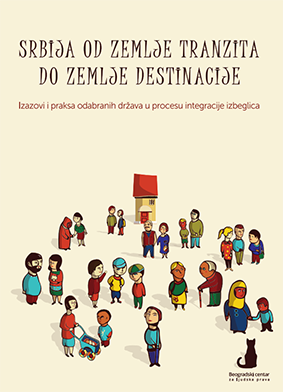The Belgrade Centre for Human Rights, in cooperation with the Embassy of the Netherlands in Belgrade and the VluchtelingenWerk Nederland in Amsterdam, prepared and published a publication titled Serbia from transit to destination country – Refugee integration challenges and parties of selected states, that deals with refugee integration in Serbia and the region. It contains recommendations for further development and harmonization with European standards in this field. Beside countries from the region (Slovenia and Macedonia) which are facing similar challenges, the publication presents the example of the Kingdom of the Netherlands, due to its impressive refugee integration system that we have a lot to learn from in the process of developing these policies.
The authors of the publication pointed out a major shortcoming of the asylum system in Serbia as the absence of institutions that would be comprehensively dealt with the integration of persons granted asylum in Serbia, as well as the lack of laws and by-laws that would closely regulate this matter. The Asylum Act lays down the general obligation of Serbia to put in place conditions for the inclusion of the refugees in the country’s social, cultural and economic life, commensurate with its capacities, and to enable the naturalization of the refugees. The Commissariat for refugees and migration is charged with the integration of persons recognized the right to refuge or granted subsidiary protection. Neither the Asylum Act nor the Migration Management Act define the specific measures or procedures for defining individual plans for the integration of individuals granted refuge. With the increase in the number of approved asylum applications, the absence of regulations facilitating integration may lead to major problem in the functioning of the asylum system.
Although the Commissariat for Refugees and Migration is legally charged with the integration of refugees, practice has shown that civil society organizations active in the asylum and migration fiels have efficiently extended both legal aid during integration and other forms of support to persons granted international protection in Serbia. The assistance has mostly taken the form of Serbian language lessons, extension of administrative aid and translation services in the beneficiaries’ submissions to the competent institutions, etc.
Inclusion of refugees into economic and social life in the Serbian society is crucial if they are to lead dignified and productive lives. Inapportune development of integration system and inclusion of asylum seekers, refugees and migrants into the labor market may only have a negative impact on longlasting chances for their economic and social intregration, leaving persons granted international protection in isolation and poverty. It is of vital importance that persons granted international protection enjoy their economic and social rights as they create basis for their well-being and they are to these persons equally important as international protection itself.
Publication in the pdf format can be downloaded here
